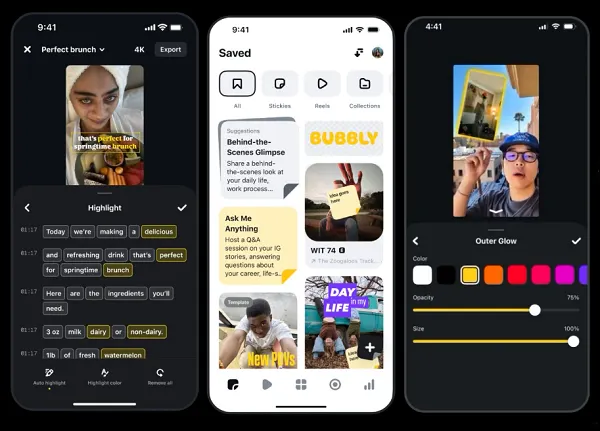11 helpful resources for improving your business skills
It doesn’t matter if you’re an entrepreneur, founder, director, or an employee working within an organization, knowing how to improve business skills will greatly impact your career success.

It doesn’t matter if you’re an entrepreneur, founder, director, or an employee working within an organization, knowing how to improve business skills will greatly impact your career success. There‘s a lot that goes into becoming more business-savvy, whether it’s learning the “softer” skills (like people management, communication, and public speaking) or mastering the “hard” skills (like accounting, operations, and finance). A lot of what I know about business has come from working within an agency, working with a wide range of businesses, and learning from people who are further into their careers than me. Here are 11 of the best resources out there to help you become more business-savvy. Having a career mentor (or a few career mentors) with business experience is a crucial part of your professional development. Opportunities are attached to people. Your mentor can provide you with support and advice when you need it — and, if you choose wisely, they'll learn how to deliver that support in a way that makes sense to you. One key to finding a great mentor is to have some clear goals in mind for the type of experience you want your mentor to have. Are you looking for someone who works in an industry you‘re interested in learning more about? Someone with experience in raising capital for a new business? Someone who’s senior to you at your current company? Once you have a goal or two in mind, there are many ways to actually find a mentor. Don‘t just go straight for the most visible and well-known (and probably busiest) people. Instead, take a look at your own network and keep an eye out for folks you respect who have relevant experience. You can search your network on LinkedIn — which means you’ll first want to update and clean up your own LinkedIn profile. If you find someone who isn't a direct connection, send a personal message with your connection request, or ask for an introduction from a mutual connection. Mentors are really important for learning how business actually works. When I started my own business, I had a mentor who supported me greatly. He helped me manage my rates, which was transformational. I also have an intentionally small network of trusted founders who act as mentors. It helps me to discuss challenges, hear other ways of handling situations, or get some feedback on my own business. My last tip here? Keep it local. While online mentorship is great, relationships grounded in quality, in-person time are usually a lot more effective. Even better, get out of the office and into an environment that's more conducive to relaxing and candid conversation, like a coffee shop or a lunch place. (If you're on the other side of the mentor-mentee relationship, read this blog post to learn how to be an amazing mentor.) No matter what your role in business is, you can follow and connect with experts on LinkedIn. I have found my LinkedIn network to be one of the most significant ways in which I have learned more about business, and in particular, marketing. I work in marketing, primarily search engine marketing and SEO, but learning about the marketing landscape is incredibly useful. I also follow entrepreneurs, consultants, and mentors! Here are some of my favorite accounts for each area of marketing. I first spoke to Yuval Ackerman when I interviewed her for my article on the anatomy of the perfect sales email. I loved her approach to ethical emails. Top tip: If you want to learn more about email marketing, HubSpot has a free email course. This course comes with a certificate, too. Megan Thudium is a sustainable marketing expert. I interviewed her when I wrote about sustainable marketing. I've also worked alongside Megan on various marketing projects, and she really is great at what she does. Leigh Buttrey is my co-founder, and she is amazing at what she does! I’ve worked with Buttrey for over ten years, so I know her advice on PPC tips can be trusted. Top tip: If you’re starting with paid media, you might want to try HubSpot’s lessons on paid media fundamentals. Kyle Rushton McGregor is a G4 mastermind. He helped me write the piece on B2B marketing analytics. He knows everything about G4 and how to get the most out of it. Top tip: For a free course on business analytics, try the HubSpot course. Sam Browne writes about LinkedIn and entrepreneurship. He’s well-known for his engaging carousel posts. While content is getting more and more snackable these days, there's still a whole lot of power in a great book. The research and writing and editing required to publish a book — especially a best-seller — is far more impressive than what goes into an article or podcast. But, of course, there‘s an overwhelming number of business books out there to choose from. And given how much time it actually takes to read a book from cover to cover, you’ll want to make sure you're making the most of your time. So, where better to go for the best books on business than the plethora of syllabi from Harvard Business School? To help you narrow down your search, my colleague Lauren Hintz combed through these syllabi for the 11 most intriguing books on HBS students‘ required reading lists. I’ve listed a few of these books below: One way to learn from experienced business leaders and innovators who have first-hand knowledge of the business world is to find and watch recordings of their talks online. TED, for instance, has some really compelling talks about business strategy you can watch for free. Here‘s one from Bill Gross, a man who’s founded many startups and incubated many others, on why some fail and others succeed based on data from hundreds of companies: There's also a lot you can learn about business from graduation speeches, from Michael Lewis' speech at Princeton about the profound connection between success and luck, to Marissa Meyers' speech at Illinois Institute of Technology about the importance of asking the right questions, surrounding yourself with the right people, and finding the courage to do things that are uncomfortable. Finally, we have recorded lectures from graduate business schools, featuring top business and government leaders from around the world. These may not be as exciting or glamorous as TED talks or graduation speeches, but many of them get into the nitty-gritty details of business strategy — the hard skills that the other types of talks don't tend to get into. While most of the live lectures are closed to non-students, many of them are posted online later. Here are a few speaker series to get you started: Let's not beat around the bush here: Public speaking is a required business skill. There's a critical value in being willing and able to communicate effectively with your team, investors, customers, and so on. Lien De Pau is the founder of The 7-Figure Exit. De Pau believes that public speaking is more important than ever. In her Forbes article, she says, “With the rise of social media and AI, public speaking is no longer an optional skill, but a multiplier for business growth.” This is one skill where practice is crucial — which is why you should join some sort of public speaking club or group if you're serious about making measurable improvements. When I first started working at a marketing agency, I joined Toastmasters to improve my public speaking and become more clear and confident in how I communicate. The sessions are usually a mix of speaking challenges — some prepared, some completely on the spot. You also practice delivering your message within a set time limit, which is surprisingly helpful. One of the best parts is getting feedback from your club after each speech, so you can keep getting better every time. Plus, these clubs are all over the world — more than 14,000 different Toastmasters clubs — and you can use their “Find a Club” tool to find the one closest to you. If you‘re willing to step out of your comfort zone, there’s actually a lot you can learn from improv about business. It can teach you how to react and adapt to new situations, how to become a better listener — perhaps most importantly — how to stop fearing failure. Improv classes are offered in cities and towns all over the world. Try searching on Google for “improv classes” + the name of your city, like “improv classes Boston.” (Here are some more Google search tips to help you narrow it down.) If you need some more inspiration, check out the INBOUND15 Bold Talk below by Dave Delaney, a seasoned improv performer and author of New Business Networking. In it, he talks all about how improvisation can improve your networking, creativity, communication, teamwork, and leadership skills. We’ve covered a lot of resources for soft skills so far. But what about the hard skills that are so critical to business knowledge, like finance, accounting, marketing, and operations? For these skills, which require the absorption of new information, repetition, and practice, we recommend taking a more formal approach. There are plenty of places you can pay to take online business classes. Coursera, for example, has a four-class specialization package called “Wharton Business Foundations,” which includes four online classes from the University of Pennsylvania's Wharton School of Business in accounting, finance, operations, and marketing. But if you‘re looking for a high-quality resource for online courses that’s free, well ... Khan Academy is the easy winner. Their whole mantra is that you can learn anything for free — and, like Facebook , they claim their services will always be free. Their courses are a myriad of lectures and interactive exercises. And their business courses include, but are not limited to: Simply go to their homepage and click “Explore” from the top navigation bar, find “Economics,” and then click the topic you want to study. But their business-related courses aren't limited to the ones in these categories. Use the search bar to find specific course topics — from the fluffier stuff, like “Turning a Hobby Into a Bright Business,” to the more complex, like “Derivative and Marginal Cost.” Another great place to learn hard skills like investments and accounting is Investopedia, a site dedicated to educating people about finance. There's great content everywhere on their site, but I want to point your attention to Investopedia's “How to Start a Business" section. This is where you can find a whole slew of guides on everything from accounting basics to valuing employee stock options to how to write a business plan. Their dictionary — which is how Investopedia started, by the way — is also a great resource for when you come across finance-related terms you aren‘t familiar with. When you educate yourself on what an Angel Fund is or how to invest capital back into your business, you’ll add a lot more value. Each definition page includes a sentence or two defining the term, a breakdown of what it means, a list of related terms (for example, on the page for “leading indicator,” you'll find a link to “lagging indicator”), related content like blog posts, and any related videos. Whereas Investopedia and Khan Academy cover more of the accounting, finance, and operations-related material, HubSpot Academy is a great place to go for marketing and sales skills. Taking the time to hone these skills will allow you to better understand how businesses work and oversee areas of a business, even if you don't completely master them. HubSpot Academy offers a few online certification courses that are free and open to anyone, whether or not you use HubSpot's software. Each class includes training videos, helpful documents, quizzes, and a final exam you need to pass to get your certification. Bonus: You can also get a Google Analytics training for free by enrolling in Analytics Academy courses on Skillshop. Business podcasts serve as a great way to stay informed and inspired when you're on the go, like on a run or during your commute. You can tune into everything from one-on-one interviews with today’s top leaders to recaps of the day’s most pressing business news. To save you some time, here's a list of some of the best business-related podcasts out there: (Here's a list with even more business podcast suggestions.) You know as well as I do how much content there is about business on the internet these days. Some of it is really good, and some of it is crap — and both sides of the quality coin can be found on the same website. But if you're looking for a resource that constantly puts out high-quality content about business, Harvard Business Review (HBR) is your source. Their articles, both online and in print, are always written by experts, and their most popular topics include managing people, leadership, strategy, communication, innovation, technology, entrepreneurship, and other business topics. If you like reading and you have some extra money to spend, some of the material in HBR's online store might be worth the investment. For example, editors at HBR created a box set of “must-reads” from combing through hundreds of articles and selected what they believe are the most important ones to help you maximize both you and your organization's performance. There’s no doubt that the best way to learn about business is by doing. I’ve learned a lot from mistakes or simply being around business-minded people. That said, it really helps to study business. If you don’t make a conscious effort to learn about business, you’ll likely fall behind your peers or won’t meet your full potential. Although learning might not be quite the same as doing, you’ll be surprised by what you can learn and how many mistakes you can avoid if you learn about business. Or, how much more efficient your business journey becomes if you commit to learning. The business resources available online are brilliant. I’ve done plenty of courses and used the certificates to build trust and help me land clients. Editor's note: This post was originally published in April 2016 and has been updated for comprehensiveness.11 Helpful Resources for Improving Your Business Skills
1. A Mentor With Business Experience

2. LinkedIn
Email

Sustainable Marketing

PPC

Analytics

Entrepreneurship

3. Harvard Business School's Reading List
4. TED Talks, Graduation Speeches & Other Recorded Speakers
5. Toastmasters
6. Improv Classes
7. Khan Academy

8. Investopedia
9. HubSpot Academy
10. Podcasts About Business & Entrepreneurship
11. Harvard Business Review
Start learning about business today.

 Aliver
Aliver 

































